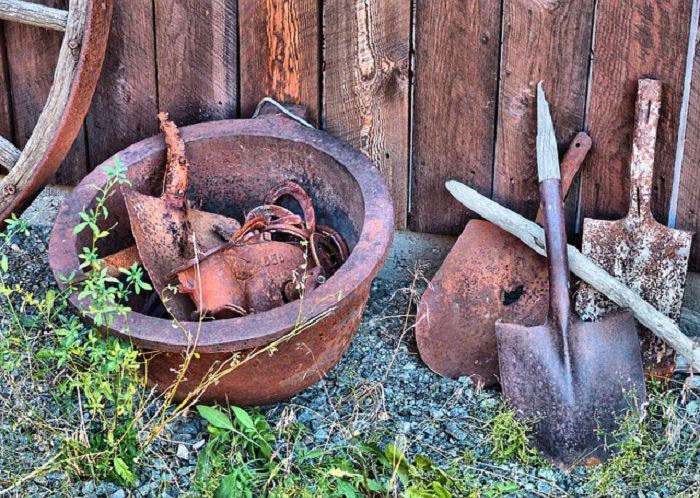__._,_.___
Posted by: Elm Belle <elm2belle@gmail.com>
| Reply via web post | • | Reply to sender | • | Reply to group | • | Start a New Topic | • | Messages in this topic (1) |
World's Best forwarded emails...
Spread a word to join amdavadis4ever-subscribe@yahoogroups.com
To translate the posted material into your native/regional language,
please visit http://translate.google.com/
Like us on facebook: amdavadi amdavadi
Spread a word to join amdavadis4ever-subscribe@yahoogroups.com
To translate the posted material into your native/regional language,
please visit http://translate.google.com/
Like us on facebook: amdavadi amdavadi
.
__,_._,___

 A trusty ally against a number of common problems, white vinegar also reacts with rust to dissolve it off the metal. This will take some time, and you will need to soak the object in the vinegar for at least a few hours, before scrubbing it off with a cloth or, if the rust is particularly stubborn, a wire brush, sandpaper or equivalent.
A trusty ally against a number of common problems, white vinegar also reacts with rust to dissolve it off the metal. This will take some time, and you will need to soak the object in the vinegar for at least a few hours, before scrubbing it off with a cloth or, if the rust is particularly stubborn, a wire brush, sandpaper or equivalent.  When used together, lime juice and salt can be an effective way of removing rust. First, you will need to sprinkle the salt over the rusted surface so it is completely coated. Next, juice some limes over the top of the item, so that the juice mixes with the salt. Use as much lime juice as you can physically squeeze out of the fruit, and then leave the resulting solution to set on the item for a few hours.
When used together, lime juice and salt can be an effective way of removing rust. First, you will need to sprinkle the salt over the rusted surface so it is completely coated. Next, juice some limes over the top of the item, so that the juice mixes with the salt. Use as much lime juice as you can physically squeeze out of the fruit, and then leave the resulting solution to set on the item for a few hours. vinegar, baking soda has a multitude of uses around the home and is a useful addition to any kitchen cupboard. To use it against rust, mix it with water until it turns into a thick, spreadable paste. Spread it across the metal using a spatula or even a butter knife. Allow it time to set and leave it for at least a few hours. Scrub it off with a brush, cloth or abrasive.
vinegar, baking soda has a multitude of uses around the home and is a useful addition to any kitchen cupboard. To use it against rust, mix it with water until it turns into a thick, spreadable paste. Spread it across the metal using a spatula or even a butter knife. Allow it time to set and leave it for at least a few hours. Scrub it off with a brush, cloth or abrasive. A more unexpected warrior against rust is the humble potato. They contain oxalic acid which can dissolve rust, but you should mix it with soapy water for best results - the chemical reaction between the two will remove rust easily.. Simply cut a potato in half and layer a liberal amount of soap along the cut surface. Take a firm grip of the potato and rub it vigorously along the surface of the rusted item, stopping to add more soap when necessary. Rinse the object when you have finished and then dry it thoroughly.
A more unexpected warrior against rust is the humble potato. They contain oxalic acid which can dissolve rust, but you should mix it with soapy water for best results - the chemical reaction between the two will remove rust easily.. Simply cut a potato in half and layer a liberal amount of soap along the cut surface. Take a firm grip of the potato and rub it vigorously along the surface of the rusted item, stopping to add more soap when necessary. Rinse the object when you have finished and then dry it thoroughly. As ever, prevention is better than cure, and these steps can help stop rust from developing in the first place:
As ever, prevention is better than cure, and these steps can help stop rust from developing in the first place:
No comments:
Post a Comment